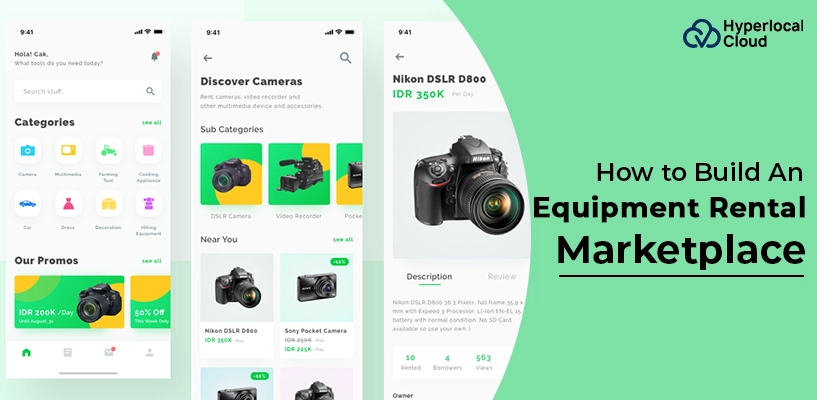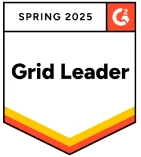How to Build An Equipment Rental Marketplace

The rise in the sharing economy is promising a new financial model that has the right potential to benefit both an individual and the business. For instance, the most quintessential examples of platforms exhibiting the essence of the sharing economy are Airbnb, Uber, and Lyft. Each has grown in revenue since the inception. This brings us to the rising scope of rental marketplaces like the ones we have discussed.
Is it a venture worth investing in? Well, this blog can help you with all your needs to build a rental marketplace.
With the rise of the sharing economy, there are all sorts of renting places on the internet. Rental for clothes, shoes, cars, and more. But today, let’s talk about equipment rental marketplaces.
Building a successful marketplace for equipment rental isn’t just about creating an app and listing products. It requires careful planning, strategic marketing, and a deep understanding of your target audience.
So in this guide, we’ll walk you through the process of building a marketplace for rentals. From choosing the right niche and platform to designing an intuitive user experience and marketing strategies, we will discuss everything. So let’s dive in and unlock some secrets.
Are you an entrepreneur and looking to build an equipment rental marketplace? Hyperlocal Cloud offers you a top-tier rental marketplace that matches all needs of your business.
Fun Facts About Equipment Rental Marketplace
| Insurance for renters is quite cheap. It is because you don’t pay for the structure, but you pay for the personal items. |
| The first equipment rental marketplace was founded in 1974, whereas the first peer-to-peer version was founded in 2008. |
| Power tools like angle grinders, chainsaws, and air compressors are the most rented item in the equipment marketplace. |
Understanding The Demand For Equipment Rental Service
Before diving into the development process of building your equipment rental service marketplace, it’s essential to understand the demand for such services. You must conduct market research to identify the industries and know people rely heavily on what type of equipment rentals.
- After surviving reduced operating costs in 2020 due to the pandemic, the equipment rental marketplace rose again in 2021 with $47.8 billion.
- It is monitored that by the end of 2024, the equipment rental industry will beat its record in 2019.
Hence, investment to build a marketplace like this can be very profitable in the future.
Benefits Of Equipment Rental Marketplace
There are many ways to benefit yourself with this type of marketplace solution. Some top benefits are:
Increase Brand Awareness
Due to the demand for equipment, a rental marketplace application that offers equipment can help businesses increase brand awareness because such marketplaces have many visitors. So there are higher chances for businesses to get their brand engaged by numerous people.
Data-Insights
The equipment marketplace can collect data depending on each transaction, which can help businesses to understand their targeted audience and make more effective business decisions.
Cost-Saving
An owner can save lots of costs because businesses can rent the equipment quickly, which can be more affordable than buying equipment outright. Also, business owners can use equipment rental to compare different vendors, which will help them find the best vendor with a determined equipment cost.
Streamlined Business Operations
The equipment rental marketplace can automate many of the tasks involved in renting, like scheduling and payments. This can help businesses free from a few tasks and focus on other factors like customer service and business marketing.
Ace The Competition
It is a common fear for new players to get rejected by the client. But with a marketplace platform like this, a business owner can easily procure the equipment needed for a big project. This helps you gain a competitive edge from the beginning of your project.
How Does An Equipment Rental Marketplace Work?
Vendors Create Listing
Equipment owners create a list of available equipment that they want to rent out on the marketplace. This listing requires the description, rate, and condition of the equipment. It also defines the availability and price of the equipment.
Users Search For Equipment
A user searches for their required equipment on the marketplace. They can search by type, price, availability, and other suitable criteria according to their need.
User Books The Equipment
Once a renter or user finds a piece of equipment that matches their need, they book it through the marketplace. Then the marketplace sends a notification to the owner, who can approve or decline the booking request as per their need.
Rental Pick-Up And Return
Once the booking gets approved, the renter can pick up the equipment from the owner. The renter or user is responsible for returning the equipment in the same condition as the way they had picked it up.
Payment Processing
The marketplace processes the payment for the rental item. The owner of the equipment receives payment minus the marketplace’s commission.
Revenue Generation Model For Equipment Rental Marketplace
After the complete development and deployment of your marketplace app, let’s understand some revenue-making models and how they benefit:
Commission: An owner earns a commission on every transaction performed on the platform.
Advertisement: The owner can host several types of advertisements for a 3rd-party, and the revenue gets decided based on the number of clicks and views.
Paid Listing Boost: The owner can charge a fee from the vendor to list their products in a featured section. It will increase the visibility of the product listing to more users and attract renters.
Subscription: The marketplace owner can offer a subscription service to their users, such as advanced search and priority customer support. The subscription charges can be obtained on a monthly or annual basis.
Leverage A Smart And Reliable Equipment Rental Marketplace Platform
Modern Features Of An Equipment Rental Marketplace
Hyperlocal Cloud offers exclusive admin, vendor, and user features on the platform. Let’s look at them:
For Admins
We ensure an admin of the marketplace monitors all the activities easily on a single platform with exclusive features:
| Features | Definition |
| User Management | An admin should be able to delete, add, and manage a user. They can also approve or reject the accounts of vendors. |
| Listing Management | An admin can approve and reject the listing, configure it, and decide the price of the products in a specific list. |
| Order Management | An admin can manage orders like processing payments, tracking orders, and resolving disputes. |
| Reports | An admin should be able to generate reports on registered users, active vendors, sales, and generated revenue. |
| Messaging | An admin can connect with both users and vendors. |
| Settings | An admin can set up terms of service, rules, and payment options in the application. |
For Vendors
Our features let a vendor give their services to users easily.
| Features | Definition |
| Booking | Vendor needs to be able to receive bookings for their equipment. The booking data includes the date, time, and place of booking. |
| Payment | Vendor should be able to receive, track and monitor the source of the payment. |
| Messaging | Vendor should be able to message the user who has booked their equipment. It will give transparency between vendor and customer. |
| Delivery | It provides various delivery options, from small to large equipment sizes. |
| Support | Vendor should be able to solve the doubts and queries of their users via calls and messages. |
For Users
We create and embed exclusive features for users to help them use the app effectively.
| Features | Definition |
| Search & Filter | User should be able to search the equipment by type, location, and availability. |
| Listing | User should be able to see the listing and pictures of the equipment description and price ranges. |
| Booking | User can book equipment and transact payment in a few clicks. |
| Rating & Reviews | Users can review & rate equipment based on their experience. |
| Connectivity | User can call and connect with a vendor and know about their orders. |
How To Build An Equipment Rental Marketplace?
Now, it is time to start with the development process. Read carefully to understand each and every development factor:
Market Research
Once you feel ready to begin the development process, start with proper market research. You can conduct market research to understand your target audience’s pain points, expectations, and preferences. This collected information will help you effectively tailor a platform to all needs. You can also analyze your competitor’s strengths and weaknesses, pricing strategies, customer reviews, and other business areas. This will help you create an effective business strategy among your competitors.
Design Prototype
Creating an effective blueprint for the app is one of the major steps to attract several customers to your online rental marketplace . An application like this must be easy to navigate, clearly categorized, and filtered for every equipment selection. It should be responsive on every device.
Development
The development process to build an equipment rental marketplace is divided into front end and back end development.
Front end development in your marketplace platform creates pixel-perfect design, font style, logos, and product listing. This part of development interacts with the user, so it needs to be accessible and responsive.
Back end development ensures all the functionalities, security of the application, and server-side rendering, payment gateways in an application. A user doesn’t interact with this part, but this development procedure is very important to run an application.
Implementation Of Secure Payment
A secure payment section in your application secures payment and builds trust between the service provider and the customer. You can partner with reputable payment gateways that offer security for renters and equipment owners. Also, consider implementing some deposit procedures that will help protect against damage and losses.
Testing
The testing phase of your application ensures the application is bug-free and error free. It also ensures the UI & UX, server renderings, payment transactions, and order processes.
Deployment
After satisfactory development and testing, we take the final step to deploy your equipment rental marketplace. The process includes configurations, updating for changes, and pushing all the codes on safe platforms like Google Play Store and Apple App Store.
Level-Up Your Rental Business And Build An Equipment Rental Marketplace
How Much Does It Cost To Build An Equipment Rental Marketplace?
The cost of development depends on various factors like features and functionality you choose, the number of hired development teams, and the complexity of the project. Keeping all factors in mind, the development price to build an Equipment rental marketplace starts from $15,000. Please note the price can rise higher or low depending on the requirements.
Bottom-Line
So at the end, we would like to say that investment in the equipment rental industry is quite profitable in upcoming years. As every offered equipment used in the rental marketplace is very useful in every sector of life, the rise in demand in this kind of marketplace is a significant growth. A proper equipment rental app development with the required features and tech stack can help you beat the competition and generate an immense number of leads.
FAQs
How Much Time Does It Take To Build An Equipment Rental Marketplace?
The development time to build an equipment rental marketplace varies on different factors like the size of your project, any 3rd party integration, the complexity of the technology, active developers, etc. On average, it takes around 10-12 weeks to get a complete solution on the rental marketplace for types of equipment.
What Are The Benefits Of Using An Equipment Rental Marketplace?
An equipment rental marketplace can help in brand awareness and cost-cutting and help you reach a maximum number of your targeted audience. Because rentals are very affordable, instead of buying new equipment for users, people easily get ready to place an order.
Why Choose Hyperlocal Cloud To Build An Equipment Rental Marketplace?
At Hyperlocal Cloud, well-qualified and skilled staff develop top-notch solutions for your business. We have decades of experience serving 1200+ worldwide clients, making us the best choice to build your marketplace platform.
What Are The Most Common Types Of Insurance I Should Avail Myself Of For My Equipment Rental Business?
Typically, you can avail of general liability, property, and work insurance for your equipment rental business. You should also opt for cyber liability insurance that recovers from data breaches and cybercrimes.





